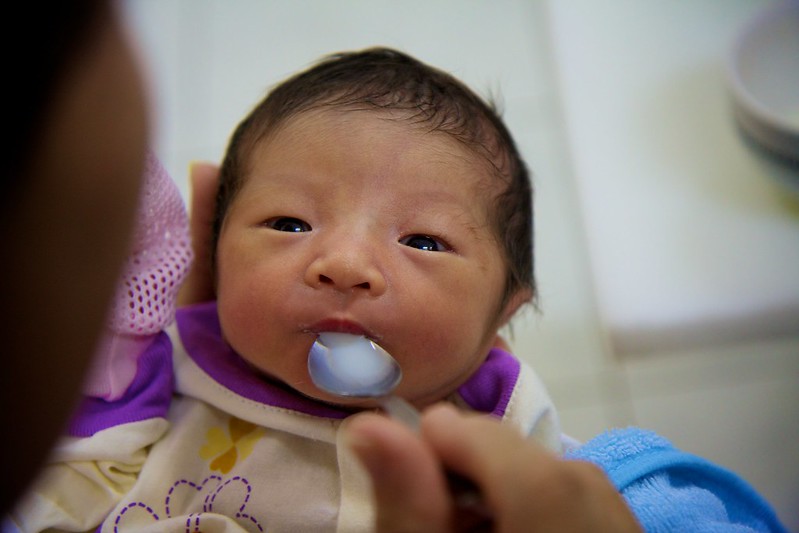SHARES

“I feel bad and I struggle to take care of my newborn baby. Sometimes, when I feel worse, I just find everything meaningless, including my own life. My doctor says I have depression related to childbirth and antidepressants can make me feel better. However, I don’t feel like taking it. My baby is still breastfeeding and I don’t want anything bad to happen to him.” Linda, 22, worries how safe psychiatric medication during breastfeeding would be and how it would affect her baby.
Is Safe Psychiatric Medication during Breastfeeding Possible?
In fact, all the psychiatric medications can pass into breast milk. Depending on the type of medication, dosage, mother’s metabolism, frequency of breastfeeding, and baby’s liver metabolism, the amount of medication reaching newborn baby can vary widely. Sometimes, babies may experience adverse effects of psychiatric medication. This is especially true for babies who are born prematurely with underdeveloped liver function. In this case, any medication entering the baby’s body can accumulate to a toxic level due to failure of the liver to metabolise and remove them.
Having said so, some medications are known to be relatively safe for the breastfeeding mother and her baby. Always practise caution when taking psychiatric medications during breastfeeding. Take note of any symptoms or behavioural changes in yourself and your baby. Discuss with your doctor to work out the best plan together for safe psychiatric medication during breastfeeding. So that your baby continues to have all the health benefits of breastfeeding whilst you receive treatment.
Types of Psychiatric Medication
Antidepressants
This group of drug has relatively safe clinical profile for the breastfeeding woman. Particularly, Selective Serotonin Re-uptake Inhibitor (SSRI) is one of the most studied class of antidepressants. Example of medication includes Sertraline, Paroxetine and Fluoxetine. Typically, there is very low or nil level of drug in the infant’s serum. Such low level of medication does not result in clinically significant blockade of the serotonin re-uptake in babies. Yet, studies do show a few infants experiencing side effects such as jitteriness, irritability, inconsolable crying, sleeping and feeding problems. Pay attention to how well your baby sleep and feed as well as look out for any changes to behaviour.
Anxiolytics (Anti-Anxiety Medication)
During the immediate period after childbirth, many women experience anxiety symptoms. The use of benzodiazepines is relatively safe with small amount of drugs present in breast milk. Less common adverse effects include sedation, poor feeding and problem with respiration in infant.
Mood Stabilisers
Lithium
Breastfeeding can affect the mother’s sleep at night. This makes it more likely for a person with bipolar mood disorder to experience relapse of symptoms. The use of mood stabilizers is a relatively tricky issue. For instance, lithium excretion in breast milk is quite high (about one-third to one-half that of the mother’s serum). This may lead to lithium toxicity in infants, affecting their thyroid gland, kidney etc. Therefore, frequent blood taking is needed (about once in every 6-8 weeks) for both mother and infant to prevent overdosing.
Carbamazepine and Valproic acid
Similarly, the use of carbamazepine and valproic acid may risk damaging the liver of infants, especially those younger than 2 years old. Thus, the baby needs to undergo frequent blood testing to make sure the liver is functioning well. Both of the drugs have relatively high safety profile.
Lamotrigine
Another relatively safe drug, called lamotrigine, is commonly used for the pregnant woman and which may be continued after childbirth. The concentration of this medication in breast milk is quite high as well (20-50% that of mother’s serum concentration). This usually causes no problem to the infant. But, the use of lamotrigine may lead to a very rare (0.1%) but serious side effect in the mother or infant, known as Steven-Johnson Syndrome (SJS). This happens because of allergic reaction to the medication, causing painful rashes, blisters and even death.
Antipsychotic Drugs
There is little data on the use of antipsychotic medication during breastfeeding, especially on newer group of atypical antipsychotic drugs. For older drugs, such as chlorpromazine, some infants experience adverse events such as sleepiness, poor feeding, and developmental delay. For newer drugs like risperidone, quetiapine, and olanzapine, even though drug excretion into breast milk is relatively low, there is still insufficient data to confirm its safety for use in breastfeeding woman. On a cautionary note, clozapine, also a newer kind of antipsychotic, can cause life-threatening side effect in adults. It may negatively impact the body’s ability to produce blood cells. This is not the first treatment of choice and is usually reserved for those who really need it.
Conclusion
There is relatively little study data on the use of psychiatric medications in breastfeeding women. Current available data are showing that SSRI use is of moderate safety. Carbamazepine and valproic acid are relatively safe medications but frequent blood testing is needed. Clozapine should be reserved for those who really need it. Have a talk with your doctor to learn more about your medications and get the best out of your treatment.
References:
1. Managing psychiatric medications in the breastfeeding woman [Medscape]. WebMD LLC. 2020. (Available from: https://www.medscape.com/viewarticle/722316; last updated on 2020; last accessed on 2020 Jul 5)
2. Tripathi BM, Majumder P. Lactating mother and psychotropic drugs. Mens Sana Monogr. 2010 Jan-Dec;8(1):83-95. doi: 10.4103/0973-1229.58821
Find a GP/Family Doctor in Malaysia, on GetDoc
Find a GP/Family Doctor in Singapore, on GetDoc
by Chang Xian
View all articles by Chang Xian.







